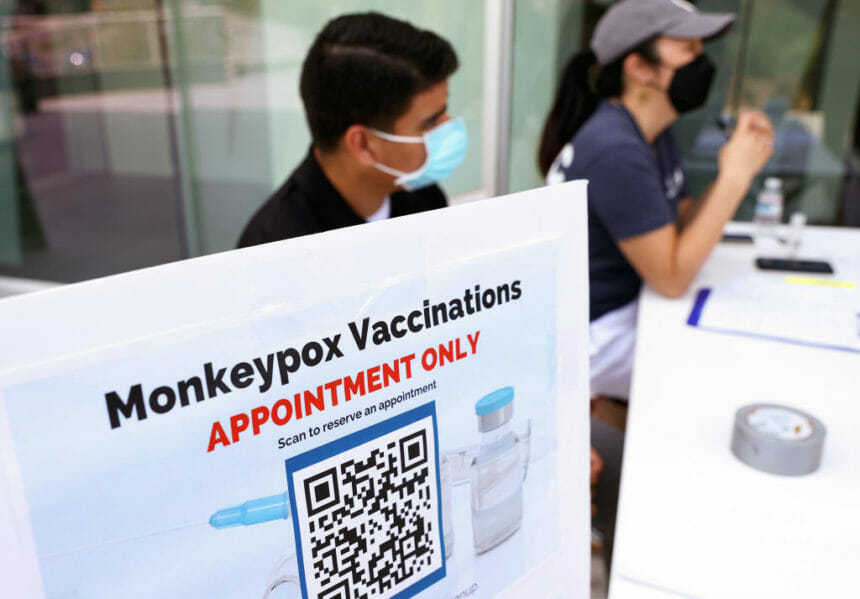On Thursday, the U.S. officially declared monkeypox a public health emergency. The announcement came after the U.S. appeared to drag its feet in developing a strategy to combat the rising incidence of the virus.
“We’re prepared to take our response to the next level in addressing this virus, and we urge every American to take monkeypox seriously,” the Department of Health and Human Services secretary Xavier Becerra said at a news briefing.
In a fact sheet, HSS noted that its plan includes increasing vaccine supply, boosting testing through commercial labs and making treatment courses — such as TPOXX — available for free.
Still, there’s been growing trepidation among public health experts that the Biden administration hasn’t moved fast enough. It’s a familiar story, one with parallels to the early response to COVID-19.
“Up to this point, the government’s initial response to the monkeypox outbreak has been slow and uncertain,” said Jon Bigelow, executive director of the Coalition for Healthcare Communication. “On the one hand, we seem to be burned out by the experience of dealing with the COVID-19 pandemic. And on the other hand, we don’t seem to have truly learned from that experience the importance of decisive early action on new outbreaks.”
Bigelow pointed to familiar areas of concern: testing, data sharing between state health departments and the Centers for Disease Control and Prevention, vaccine distribution and a flood of misinformation.
At a recent news briefing, FDA commissioner Dr. Rob Califf defended the government’s monkeypox response.
“It’s a very difficult disease to treat, given the fact that it hasn’t been around in large numbers,” he said. “It’s not a new disease, but it’s not a disease that we’ve been dealing with in our traditional health system. We are continuing to ramp up our efforts and you’ll hear a lot more about this increasingly until we get it under control.”
Among the most glaring failures to date, a large number of doses of the smallpox vaccine that’s effective for monkeypox, Jynneos, were discovered to be expired. The U.S. had 20 million doses of the vaccine safeguarded in the Strategic National Stockpile, but by the time monkeypox reared its head there were only 2,400 usable doses.
In 2020, the U.S. ordered 1.4 million frozen doses from Denmark-based Bavarian Nordic, the company that produces Jynneos, and the country has been able to procure 372,000 of those doses. But the remaining 1 million sat in a facility in Denmark owing to FDA delays in inspecting it.
As a result, many people infected with monkeypox or at risk of being infected have been unable to receive the shot.
In his media briefing, Califf defended the government’s actions to provide access to the vaccine. “We moved very fast, considering we had a manufacturing plant that had to be inspected,” he noted. “We had to make sure the product was in fact active, because the only thing worse than not having a vaccine is having a vaccine which is widely distributed that is not effective.”
The federal government has since asked Bavarian Nordic to provide as many doses of the vaccine as possible. But building up an adequately sized stockpile could take months.
Meanwhile, Bigelow is concerned that the CDC, FDA and other federal agencies will once again struggle to communicate clearly with the public.
“With monkeypox, we need to address many of the same communication challenges seen with COVID-19: Clarifying what the disease is, how it is and is not spread, how best to use vaccines, which drugs do and do not work, why public health advice may evolve as the outbreak or the virus evolve, aggressively countering misinformation spreading on social media, and avoiding feeding into partisan divides on what should be a nonpolitical issue,” Bigelow explained.
The Biden administration’s communication strategy is even more important given the outsized risk monkeypox poses to the LGBTQ community. It needs to orchestrate communication in ways that don’t stigmatize any potential population.
“It’s important to provide clear and practical information about risk factors so that those most vulnerable are better informed and can protect themselves. But we also must be sensitive to how this message gets more broadly communicated to avoid feeding into homophobia,” Bigelow said.








